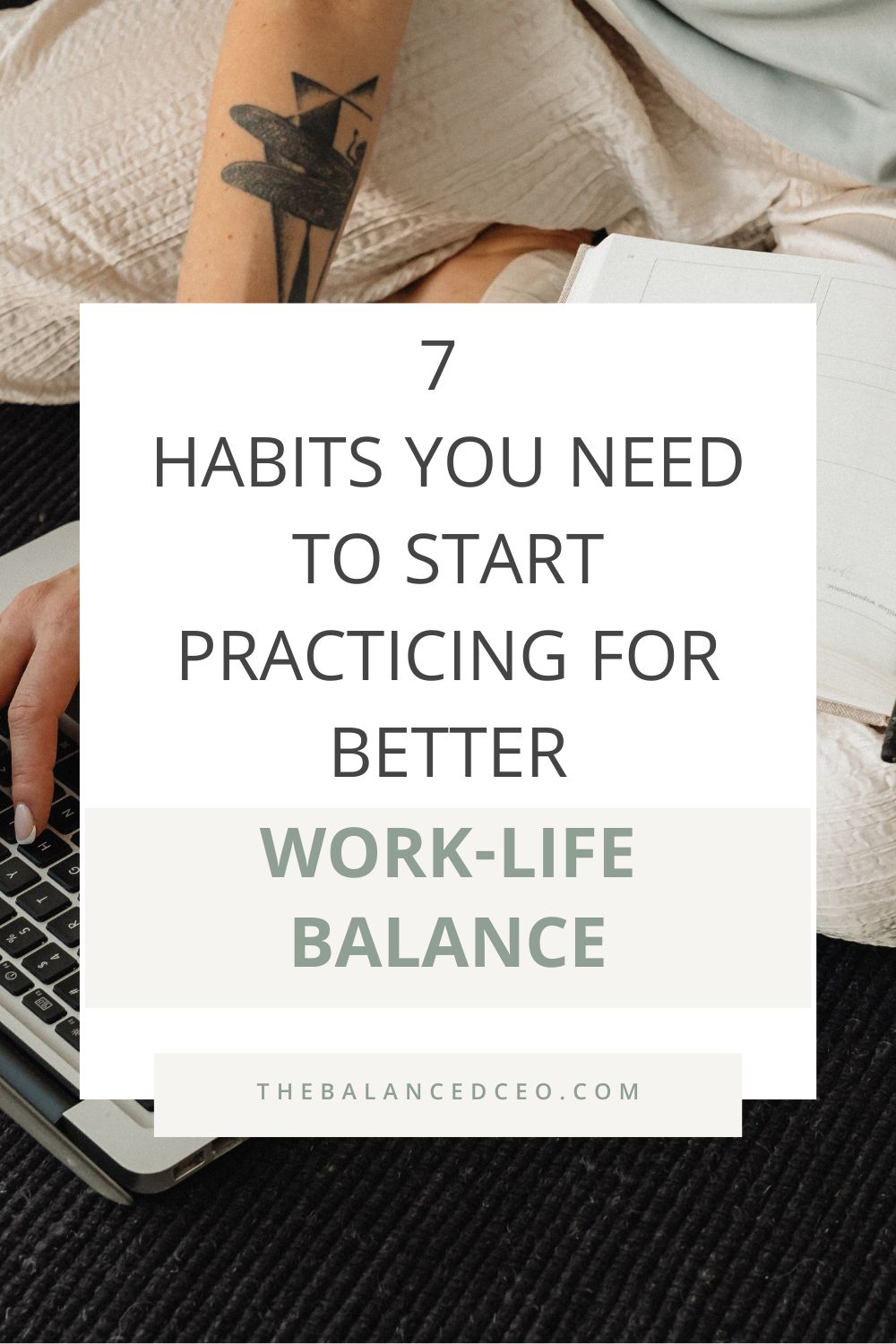This post may contain affiliate links, which means I’ll receive a commission if you purchase through my links, at no extra cost to you. Please read full disclosure for more information.

Maintaining work-life balance is something almost every working person struggles with. Your hours in a day are limited. With commutes, work, and other responsibilities, there’s not much time left for anything else. This issue is even more evident in the age of remote work. Even at home, so close to your loved ones, you can’t find time for them or yourself.
Without proper balance, you might neglect your health and personal relationships, leaving you burnt out and exhausted. The right habits can help you find balance and spend more valuable time doing the things you love. Here are some habits you can start with:
1. Start and End Your Days Right
Creating routines can help you achieve work-life balance. When you don’t have a set routine, there’s a tendency for work to consume your days. You’ll wake up in the morning rushing to work, and you’ll go home at night exhausted from work. Your mornings and nights are perfect opportunities to care for yourself and connect with those you love.
Create a healthy and meaningful morning routine. Spend some time with your loved ones and eat a healthy breakfast. Make time for exercise and engage in meaningful conversation. When you come home, take some time to wind down. Relax and do things that interest you. Spend some time with your family and ask them how their day was.
These small pockets of time at the start and end of your day can enrich your life and give you a sense of balance.
2. Manage Your Time
Time management is one of the most important skills to master. Managing your time at work can help you finish things on schedule so you don’t need to stay longer at the office or bring work home. Time management is also essential when you work remotely. There are plenty of distractions at home, so you must take steps to finish work on time.
Thankfully, there are many tools out there to help with productivity. You can download productivity apps that can help you streamline your workflow. You can also use a timer to track how long it takes you to finish tasks. A quality timer with a big display can serve as an effective visual representation of your productivity.
You can also apply some techniques to help you become more productive. Some examples include the Pomodoro technique, Timeblocking, and Batching method.
3. Remove Time Wasters
It’s easy to get distracted at work. Who wouldn’t want to escape a little bit in the middle of a stressful day? However, distractions can be a real problem. Around 31% of employees waste 30 minutes daily, while 10% can waste more than three hours. Work doesn’t get finished on time, so many extend their work hours instead of signing off and enjoying the rest of their day.
Note things that waste your time at work. Some notorious time-wasters are social media, emails and pointless meetings.
To help you spend your time more productively, keep your phone away and turn off social media notifications. You can also use site blockers to eliminate the temptation to scroll online.
Don’t spend hours in the middle of the day checking emails. Instead, set aside time in your day to check and answer important ones. Assign a few minutes at the beginning and end of your shift to get all those necessary emails out.
Finally, try not to set too many meetings. Evaluate first if it is really necessary or if you can simply relay information through emails or instant messages.
4. Designate a Clear Working Space
Many people have chosen to work from home despite offices opening again permanently. Working from home can offer flexibility and other benefits. If you don’t have a designated work space, your home and work life can mix, sometimes for the worse. Ultimately, you’ll only give half of yourself to your family and work.
If you work remotely, clearly designate your workspace and keep it separate from the rest of the house. You want to give your 100% at work so that later, when you clock out, you can spend quality time with your family.
5. Set Boundaries
Setting boundaries can be challenging. However, it is necessary to balance your work and personal life. At work, set boundaries with your coworkers. You will end your day at the right time and won’t accept or take home any more work. It can be challenging to say no, but your coworkers might overstep and take advantage of you if you don’t draw a clear line. You can still handle extra work the next day, but you’ll never recover those precious hours with your children again.
If you work from home, setting boundaries is even more important. Some employers will overload you with work since there’s an unfair perception that you’re just sitting comfortably at home. Draw that line clearly to avoid overworking.
6. Take Breaks
Even machines need breaks, and you’re far from being one. You’re a human being who needs to recharge and refocus occasionally. Allow yourself to take reasonable breaks within your work day.
Every time you feel too stressed, stuck, or out of ideas, take a break. Go and take a short walk and stretch your legs. Grab a snack or coffee if you’re low on energy. When you return to your desk, you’ll feel much better and ready to focus.
Too sleepy in the middle of the day? Don’t be afraid to take a nap. Studies show that mid-day naps increase workers’ productivity, cognition, and psychological well-being. Many employers understand the benefits of naps, so they install napping areas to help exhausted employees recharge. If you work remotely, you can walk away from your desk and take a short nap. Just remember to set an alarm.
Long breaks are equally as important as daily short breaks. Don’t let your paid time off go to waste. Book a short vacation and take a break from the monotony of work. Better yet, go on vacation with your loved ones so you can spend quality time with them.
7. Get Active
Poor health can steal time from you in more ways than one. You need to maintain your health to have the energy to spend quality time with your loved ones. You also won’t be able to focus and give your best at your job.
Staying active when you’re so busy can seem impossible. However, if you commit to it, you’ll find yourself happier, more productive, and more motivated.
Dedicate a few minutes of your day to being active. You can start simply by doing full-body stretches before or after work. Jogging in the morning can also do wonders.
This professional dentist in Los Angeles CA adds that regular health checkups are just as important as staying active. Routine visits to your doctor can help detect potential health issues early, ensuring you stay in the best shape to enjoy life and work efficiently.
Finding and Maintaining Balance in Life
It’s important to work diligently to achieve your goals. However, you shouldn’t lose sight of why you’re working so hard in the first place. Your life is so much more than just work, so make time for your interests, hobbies, and loved ones. Through balance, you can live a happy, enriching life.

Cora Gold
Contributor
Cora Gold is the Editor-in-Chief of Revivalist magazine, a publication dedicated to happy, healthy, and mindful living.





Leave a Reply